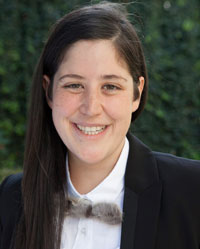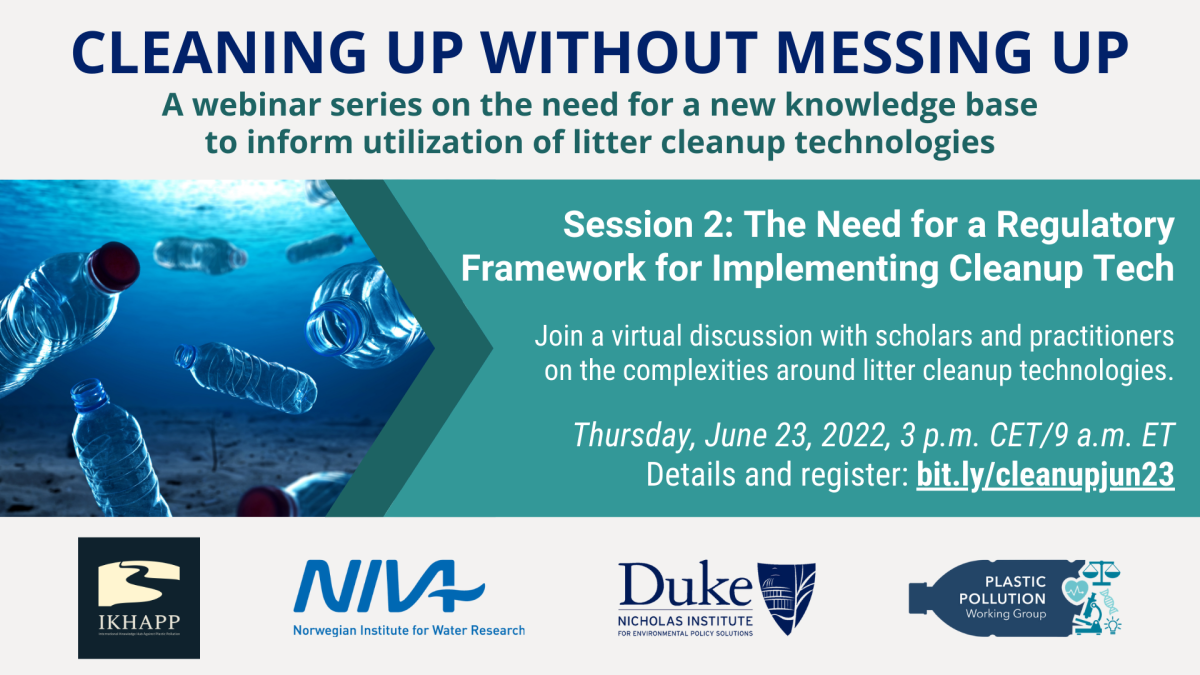
Adam Lindquist, Vice President Of Programs & Environmental Initiatives, Waterfront Partnership of Baltimore
- Adam is a passionate advocate for the creation and activation of waterways, parks, and other public spaces for environmental, educational, and recreational use. He received his Master of Community Planning from the University of Maryland in 2010 and joined Waterfront Partnership shortly thereafter. Adam leads the Healthy Harbor Initiative as well as events and programs for the organization. In addition to creating Baltimore’s iconic Mr. Trash Wheel, he led the Great Baltimore Oyster Partnership in raising over a million oysters in the Baltimore Harbor, launched the Harbor Scholars program to help improve environmental education in Baltimore Schools, and is spearheading the Baltimore Blueway, a water trail planning effort.

Rachel Karasik, Policy Associate, Nicholas Institute for Environmental Policy Solutions, Duke University
- Rachel joined the Nicholas Institute as a Policy Associate in January 2019 and works for both Oceans and Coastal Policy and Ecosystem Services Programs. Rachel’s work focuses on the global plastics policy landscape, socioeconomic outcomes of coastal restoration, equity in environmental management, and STEM outreach. Prior to joining the Nicholas Institute, she worked for the Environmental Defense Fund and the Nicholas School of the Environment, focusing on fisheries management. Rachel received her Master’s degree in Environmental Management from Duke’s Nicholas School of the Environment and her Bachelor’s degree from New York University. Her Master’s research was on seafood access in food deserts in North Carolina.

Tony Walker, Dalhousie University
- Dr. Tony Walker is an Associate Professor at the School for Resource and Environmental Studies, Dalhousie University in Canada. Tony has studied impacts of plastic pollution for nearly 30 years. He helped participate in a Leaders and Experts Roundtable on Plastics and Marine Litter to help develop the Ocean Plastics Charter for Canada’s 2018 G7 presidency. He participated in the Canadian Science Symposium on Plastics to inform represented Canada at the G7 Science Meeting on Plastic Pollution in Paris, France. He has published extensively on policies to reduce impacts of plastic pollution and is Associate Editor for Marine Pollution Bulletin.

Justine Ammendolia, Ph.D. Candidate, Dalhousie University
- Justine Ammendolia (she/her) is a PhD student at Dalhousie University in Halifax, Canada. Her work investigates the interfaces of environmental monitoring, characterizing plastic pathways and pollution mitigation strategies via science policy. Justine has a background in marine biology and has researched plastics for seven years; her work has ranged from bioingestion and coastal debris monitoring in Newfoundland to quantifying global COVID-19 related debris. She is a National Geographic Explorer and regularly works with the Society on science communication initiatives and volunteers on the Youth Council for the Chief Science Advisor of Canada. Justine is both a Killam and NSERC CGS-D Scholar.

Idun Rognerud, Research Scientist, Norwegian Institute for Water Research
- Idun Rognerud is a research scientist at the Norwegian Institute for Water Research, Section for Water and Society. Idun has experience from research and capacity building projects on plastic pollution in China and Southeast Asia. She currently works on the governance and regulation of plastic pollution at the global level, and is particularly interested in the design of the global agreement on plastic pollution.

Giulia Leone, Ph.D. Fellow, Flanders Marine Institute
- Giulia Leone is an Italian researcher currently conducting her Ph.D. at the Department of Animal Sciences and Aquatic Ecology at Ghent University in collaboration with the Flanders Marine Institute (VLIZ) and the Research Institute for Nature and Forest (INBO), Belgium. Giulia holds a Bachelor's Degree in Biology from Turin University (Italy) and a Master’s Degree in Marine Biology from Groningen University (The Netherlands). Considering her strong interest in the ecological and social implications of plastic pollution, before starting her Ph.D. project, Giulia volunteered in the Research Team of The Ocean Cleanup, focusing on the analysis of plastic debris, and, afterward, worked at VLIZ as a Plastic Researcher on the PLUXIN project which aims to map and remediate plastic pollution in rivers. Her current Ph.D. research, financed by the Research Foundation Flanders (FWO) and which started in November 2021, has two main goals. First, the project aims to understand what are the variables or parameters that might play a role in influencing the chances of plastic or biota being collected by plastic clean-up technologies. The second aim is to create an open-access probabilistic model, namely a Bayesian Belief Network, to assist stakeholders in their selection of plastic clean-up mechanisms based on the particular parameters present in the area. One of the advantages of these specific models is that data can be acquired from multiple sources: existing literature data, experts' knowledge from plastic clean-up companies, and mesocosm experimental work. The final model will be an effective tool to support stakeholders in their decision-making process.

Zoie Diana, Ph.D. Candidate, Marine Science and Conservation, Duke University
- Zoie Diana is a fifth-year Ph.D. Candidate in Marine Science and Conservation with a certificate in Integrated Toxicology and Environmental Health at Duke University. Zoie's research interests broadly focus on single-use plastic pollution management, specifically focusing on how governments, businesses, and biologists view and mitigate plastic pollution. One aspect of this research includes the use of plastic pollution cleanup technologies.

Olivia Helinski, Natural Resource Management Assistant, National Park Service Water Resources Division
- Olivia Helinski recently started her career with the National Park Service in their Water Resources Division. Her work is centered around managing sediments and shorelines for the coastal, ocean, and Great Lakes parks. She received her Bachelor of Science in Civil Engineering from the University of Portland, Oregon in 2021. During her time as an undergraduate, she worked as a research assistant studying plastic pollution from several angles: synthesizing the current available removal technology, collecting and processing microplastics in the field, and designing a device with her engineering capstone team for trash collection and tracking. After college, she participated in the Juneau Icefield Research Program where she worked with glaciologists to conduct research on the Juneau Icefield in Southeast Alaska. When she doesn’t have her head wrapped around research, she can be found hiking in the mountains and dreaming about her endless ideas and goals.











